Photos: MICHAEL TRAN/AFP via Getty Images; Frazer Harrison/FilmMagic; Albert L. Ortega/Getty Images; Samir Hussein/WireImage
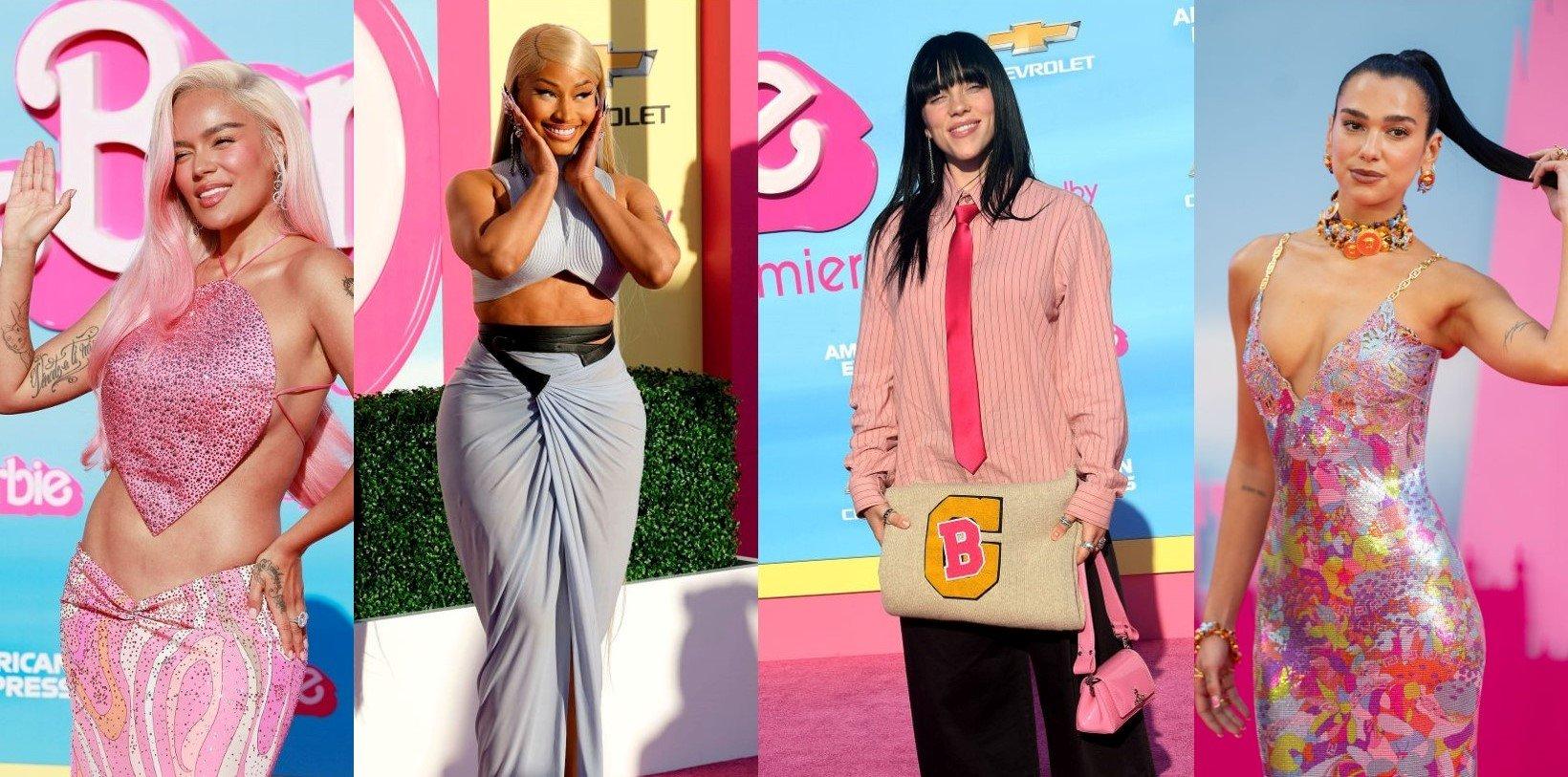
feature
Road To 'Barbie The Album': How Mark Ronson Dolled Up The Movie's Polished Pop Soundtrack
On the moodboard, she's the inspo. Greta Gerwig's film 'Barbie' releases worldwide on July 21 — and so does its star-studded, Mark Ronson-produced soundtrack. Take a look at how the fantastic plastic of 'Barbie The Album' came together.
This summer, everyone's hot (pink) with Barbie fever.
In the last few months, seemingly all corners of the world have been painted Barbie pink. From floods of #barbiegirl TikToks to ubiquitous brand collaborations, there's been no shortage of almost alarmingly efficient marketing for Greta Gerwig's upcoming blockbuster Barbie.
Out July 21, the fantasy comedy spotlights Margot Robbie and Ryan Gosling as Mattel's classic Barbie doll couple, alongside a slew of other major stars including Issa Rae, Will Ferrell, America Ferrera, Kate McKinnon, Simu Liu, and plenty more.
The highly anticipated Barbie soundtrack is helmed by Mark Ronson, the seven-time GRAMMY-winning producer known for working with artists like Lady Gaga, Paul McCartney, Amy Winehouse, and Miley Cyrus. Ronson's nearly year-long work on Barbie The Album kicked off when he checked his phone and saw a one-word text: "Barbie?"
The text came from producer George Drakoulias, who previously worked with Barbie co-writer Noah Baumbach on critically acclaimed films like Marriage Story and White Noise. Drakoulias shared details about the project, and Ronson was sold.
"I don't read a lot of scripts, but it was just everything I want in a movie," Ronson remembered in a Rolling Stone profile. "I was like, 'If I don't get this gig, this is gonna be my favorite movie of the year.'"
Ronson happily signed on as the soundtrack's executive producer — in his own words, becoming "the Robin to [Gerwig's] Batman" — and he hopped on a preliminary Zoom with Gerwig and Baumbach while they were in England gearing up for production.
As they brainstormed for Barbie The Album, Gerwig sent over a playlist of some of her favorite songs, which featured everything from Andrea True Connection to music from Xanadu, to what Ronson personally dubbed "Peloton pop." Spitballing ideas evolved into a crystal pink vision for Barbie The Album, which would be 17 tracks in total and featuring everyone from Lizzo to FIFTY FIFTY to Tame Impala to even Gosling himself.
Speaking to the New York Times, Gerwig described the film Barbie as an "anarchic dance-party emotional meltdown spiritual quest." In line with the movie's chaotic good, she and Ronson wanted the soundtrack to be many, many things: poppy, playful, whimsical, nostalgic, and most importantly, full-hearted.
With all this in mind, there was more news: Barbie would feature a highly-choreographed dance number, and Ronson was tasked with putting together the film's central groove. Rehearsals were scheduled to hit the floor in two weeks.
Ronson and producer Andrew Wyatt — who would end up scoring the entire film together — got to work, crafting the fluttery, up-tempo beat to "Dance The Night" to power the film's core dance scene. Caroline Ailin also contributed as a songwriter to what would become Barbie's defining lead single.
"It became the Barbie anthem on set," Robbie shared with Rolling Stone.
According to Robbie, Barbie cast members rehearsed to the temporarily lyricless song, following only its whirling beat. That is, until Ronson slid into Dua Lipa's DMs to recruit her for the track. Channeling carefree fun reminiscent of Future Nostalgia, Lipa felt like a perfect fit for the song's retro disco relief. (Gerwig later invited the three-time GRAMMY winner to play the neon-pink-wigged role of Mermaid Barbie.)
"Dance The Night" unmistakably bubbles as the buoyant centerpiece of Barbie The Album; in fact, it's featured just 10 seconds into the film's trailer. As Barbie floats down from her dreamhouse, the song's strings flourish with nu-disco verve, luring viewers in and spiritedly signifying the magic of Barbie Land.
It's this breezy, dance floor-ready energy that Barbie The Album epitomizes. The record refracts the light of a disco ball, equating an evening at a club with a spiritual experience. In Gerwig's world, Barbies are — ironically — never boxed in.
While the album thrums with the rhythm of a nonstop party, Ronson still finds moments to hint at profundity, beneath the film's slick comedy. "Even when the tears are flowin' like diamonds on my face/ I'll still keep the party goin', not one hair out of place," Lipa sings in "Dance The Night."
The track's juxtaposition of sorrow and partying represents Barbie perfectly, nodding to the doll's controversial history. Since its 1959 launch, Barbies emerged as symbols of both female empowerment and unrealistic standards for women.
"I kept thinking: Humans are the people that make dolls and then get mad at the dolls," Gerwig explained to the NYT. "We create them and then they create us and we recreate them and they recreate us. We're in constant conversation with inanimate objects."
This idea of creating and recreating applies not just to the film, but its music, too. A modern musical reimagination filled with nostalgia, Barbie The Album slots in several iconic samples, including Toni Basil's 1981 "Mickey," Janet Jackson's 1997 "Together Again," and Aqua's 1997 "Barbie Girl."
"I was like, 'Greta, how are we going to incorporate this song? We can't do a Barbie movie and not have a nod to Aqua's 'Barbie Girl.' It has to be in there,'" Robbie told Rolling Stone. "And [Greta] was like, 'Don't worry, we're going to find a cool way to incorporate it.'"
Gerwig's response was apparently code for "get Nicki Minaj to hop on the track." Minaj made the top of Ronson and Gerwig's "dream list" of artists for the soundtrack — no doubt because of her reigning title as queen of the Barbz. The fanbase name emerged after the cover of Minaj's debut 2007 mixtape, Playtime Is Over, featured the rapper as a Barbie doll within a Mattel box.
"I feel like people have been asking Nicki to rhyme over some version of 'Barbie Girl' for 15 years now," Ronson estimated in conversation with Rolling Stone.
In her pink carpet interview with "Access Hollywood," Minaj admitted it took her a second to warm up to the track's Aqua sample: "I didn't even want to listen to this song because a lot of people have sent me that sample for years, and I never like it!"
But the rapper knew she wanted to be a part of Barbie. "So the next day, I mustered up the courage to listen to the song, and then I loved the beat, and that sold me," Minaj continued.
Once Minaj jumped on the track, Ronson began chasing down another one of today's hottest names in the rap scene: Ice Spice. The 23-year-old Bronx rapper almost didn't make the track because of her demanding schedule, but one night, she found the time to slide into the studio — just as Ronson was getting ready to go to sleep "like an old guy." He biked to the studio after midnight to track her verses, and "Barbie World" was born.
The track marked a "very full circle moment" for Minaj — as well as for Charli XCX. The pop singer told Rolling Stone that her first live performance was actually of Aqua's "Barbie Girl." Although XCX beheaded her Barbie dolls when she was younger, her a cappella rendition of Aqua's hit earned her a win in a cruise ship talent show.
Years later, XCX traded cruise ships for "lavender Lamborghinis" in her 2016 magnum opus "Vroom Vroom." So when Ronson and Gerwig showed XCX a few Barbie clips to choose from, it's no surprise that XCX was immediately drawn to the car chase scene. XCX's Barbie track "Speed Drive" runs through all the red lights, interpolating Toni Basil's "Mickey" as well as sampling Robyn's cover of Teddybears' "Cobrastyle" to assemble one of the album's many hot girl anthems.
And where there's a hot girl anthem, there's a sad girl anthem. Billie Eilish and Sam Smith were recently revealed to be the album's mystery guests, and Ronson put the former behind the wheel for "What Was I Made For?", with her brother and producer FINNEAS riding shotgun. For the siblings, working on Barbie helped flare a creative spark they felt had been dimming.
"We were really in a zone of feeling like we lost it and feeling like, 'man, I don't know if we can do this anymore,'" Eilish shared with Zane Lowe on Apple Music 1. "Barbie and Greta just pulled it out of me, I don't know."
The seven-time GRAMMY winner shared that writing for Barbie The Album allowed for her to refreshingly write from a new perspective — before realizing that she was actually reflecting on herself.
"I did not think about myself once in the writing process. I was purely inspired by this movie and this character and the way I thought she would feel, and wrote about that," Eilish continued with Lowe. "But I do this thing where… I'm writing for myself and I don't even know it."
Just as Eilish's inspiration came from processing her relationship with Barbie, other musicians featured on the album also held personal connections to the doll.
Barbie was rooted in HAIM's childhood. The sisters grew up in Los Angeles in the '90s and self-labeled themselves as "Barbie specialists." Funnily enough, the siblings were allowed just one VHS tape: a Barbie film.
Ronson and Gerwig fell into the habit of showing soundtrack participants scenes from Barbie during the creative process, offering more context for the pair's vision. The HAIM sisters found themselves watching scenes from Gerwig's Barbie to pen "Home" for the soundtrack.
"Karol G was instantly telling us how much Barbie meant to her," Ronson told TIME.
"I wanted to see the movie first to understand the project because we know the doll as a perfect figure, so I needed to understand the film's message," Karol G told HOLA! USA. "Then we met [with the Barbie team], and they shared the songs they loved and the rhythm they were looking for... I wanted that when they played the music; it sounded like a real party. A Latino party!"
The Colombian reggaetonera collaborated with Panamanian rapper Aldo Ranks, recording the thumping reggaeton banger "WATATI" for the album.
Ronson ensured that Barbie The Album stylishly encompassed a wide number of genres, and its variety serves an asset to the film's worldbuilding.
"[Gerwig] had a vision for a really diverse and unique world that she was creating," Brandon Davis, Executive Vice President and Co-Head of Pop A&R at Atlantic Records, said to Rolling Stone. "That's why you're hearing, for instance, a Karol G record that leans more reggaeton next to a Dominic Fike record that's a nod to Sugar Ray."
The slogan of Mattel's signature doll is simple: "You can be anything." Barbie The Album encapsulates this effortlessly, blurring the soft lines between disco pop and drill. The soundtrack even features an Irish jig, unexpectedly on PinkPantheress' wistful song "Angel."
"The soundtrack reminded me of a 2000s Disney prom scene. I was just like, let's try it and see what they think. I just wanted to have fun," the pop star told ELLE. The chorus' uplifting jig gave "Angel" the necessary "soundtrack vibe" she was looking for.
Before kicking off her musical career, PinkPantheress was originally on an acting path. Having studied Gerwig's filmography in school, she was "gassed beyond belief" to join the Barbie team. "I do not think that anyone knows me. I'm always surprised," PinkPantheress said. "So, the fact that Greta Gerwig [does]..."
PinkPantheress knew that thinking pink meant she was on the right track — the color's in her stage name, after all.
"When I listen to ['Angel'], all I think about is the color pink. And when I think of pink, I think of Barbie," she said.
At the end of the day, it's Barbie's world, and we're just living in it. Gerwig pulled us into this glossy, fuschia-flushed world, and Ronson fluidly soundtracked its complementary pop paradise. Ronson spoke highly of the writer-director, citing not only her impressive innovation and drive but her presence alone as uplifting.
"Greta proves that you can be an incredibly strong-minded visionary, but inspire people by just your goodness alone," Ronson told Vanity Fair. "Everybody just felt so free to create."
This open, creative freedom is what makes Barbie truly Barbie. Mattel’s slogan rings true in Ronson’s soundtrack, pulsing like a Barbie dreamhouse party come to life. Songs range from trend-setting and bubblegum to comedic and quirky, but above all, the rosy soundtrack glimmers with moments of sincerity.
One thing about Barbie? She'll always think outside of the box.
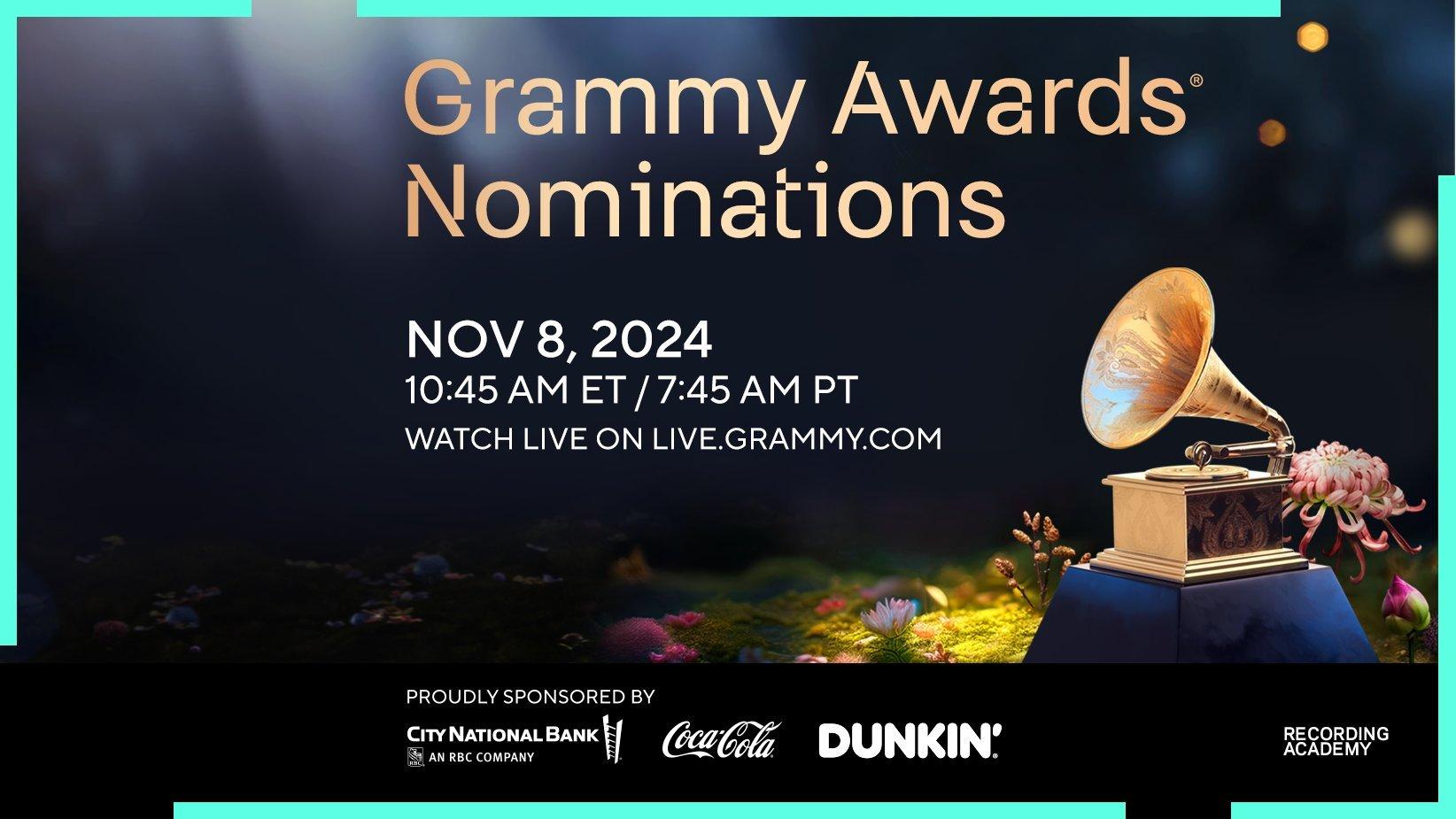
Graphic courtesy of the Recording Academy.
news
How To Watch The 2025 GRAMMY Nominations: Mark Ronson, Kylie Minogue, Victoria Monét, Brandy Clark, Kirk Franklin & More To Announce The Nominees; Streaming Live Friday, Nov. 8
Watch the 2025 GRAMMYs nominations live on live.GRAMMY.com and YouTube starting at 7:45 a.m. PT / 10:45 a.m. ET. Read on for everything you need to know about nominations, which will be announced on Friday, Nov 8.
The 2025 GRAMMYs season is officially here. The 67th GRAMMY Awards nominations will take place on Friday, Nov. 8, 2024 at 7:45 a.m. PT / 10:45 a.m. ET, featuring guest appearances from multiple GRAMMY-winning artists, including Mark Ronson, Kylie Minogue, Victoria Monét, Brandy Clark, Kirk Franklin, and others.
Then, it's the main event: The 2025 GRAMMYs, officially known as the 67th GRAMMY Awards, take place Sunday, Feb. 2. The ceremony will be held at Crypto.com Arena in Los Angeles, broadcast live on the CBS Television Network and streamed live and on demand on Paramount+.
The GRAMMY Awards celebrate the artistic excellence that defined the year in music. As music's only peer-recognized accolade, the Academy’s Voting Member body — made up of active music creators representing more than 22 different music genres and over 13 creative disciplines, including songwriters, composers, producers, engineers, and more — are eligible to vote for the GRAMMY Awards. These members ultimately determine the nominees and winners on Music's Biggest Night.
Check below for a full guide to the 2025 GRAMMYs nominations livestream event happening next week proudly sponsored by City National Bank, Coca-Cola, and Dunkin'.
Follow "Recording Academy/GRAMMYs" on X, Instagram, Facebook, TikTok, and LinkedIn, and use #GRAMMYs to join the conversation as it unfolds on Nov. 8.
How Can I Watch The 2025 GRAMMY Nominations?
Watch the full 2025 GRAMMYs nominations livestream event on live.GRAMMY.com, your go-to destination for all things GRAMMYs all year long — 24/7, 365, and the Recording Academy's YouTube channel.
This year, the Recording Academy is revolutionizing the GRAMMY digital experience with the improved live.GRAMMY.com, a dynamic, expansive online experience providing music fans a backstage view into Music's Biggest Night. Featuring a multi-screen livestream you can control, live.GRAMMY.com is where you can watch all the highlights from the 2025 GRAMMYs in one place before, during and even after the telecast. Catch GRAMMY performances, acceptance speeches, the GRAMMY Live From The Red Carpet livestream special, the full Premiere Ceremony livestream, behind-the-scenes backstage moments, and so much more.
Updating in real time, live.GRAMMY.com gives music fans an exclusive peek into this year's official GRAMMY Week celebrations, a multi-camera video feed giving fans a true 360-view into the GRAMMY Awards, and exclusive articles, performances, interviews, and videos.
When Are The 2025 GRAMMY Nominations Announced?
The 2025 GRAMMY nominees will be unveiled during a livestream event on live.GRAMMY.com and YouTube, kicking off with a special presentation announcing the nominees in the General Field and select Categories. Video announcements of the nominees in the remaining Categories will also be published on live.GRAMMY.com and YouTube while the event is underway, and the full list of nominees will be published on GRAMMY.com immediately following the presentation. Nominees will also be announced via a press release.
The schedule for the 2025 GRAMMYs nominations livestream event is as follows:
GRAMMY Nominations Pre-Show
7:45 a.m. PT / 10:45 a.m. ET
Watch the 2025 GRAMMY Nominations Pre-Show, which takes place ahead of the 2025 GRAMMY nominations on Friday, Nov. 8, 2024. Hosted by Emmy-Award-winning TV hosts and "Entertainment Tonight" correspondents Cassie DiLaura and Denny Directo, the 2025 GRAMMY Nominations Pre-Show is an inside look at the various departments and initiatives that the Recording Academy — the organization behind the annual GRAMMY Awards — supports on a year-long basis on its mission to recognize excellence in the recording arts and sciences and cultivate the well-being of the global music community.
Nominations Livestream Event
8 a.m. PT / 11 a.m. ET
Nominations Livestream Event Ends & Full Nominations Revealed
8:30 a.m. PT / 11:30 a.m. ET
GRAMMY Nominations Wrap-Up Show
Immediately following the end of the nominations livestream event
Watch our exclusive 2025 GRAMMY Nominations Wrap-Up Show where correspondents Cassie DiLaura and Denny Directo discuss your favorite artists and the biggest trends to come out of the 2025 GRAMMY nominations. The show offer s music fans the inside scoop into all the biggest news and top stories from the 2025 GRAMMY nominations.
For more information about the 2025 GRAMMY Awards season, learn more about the annual GRAMMY Awards process; read our First Round Voting guide for the 2025 GRAMMYs; read our FAQ (Frequently Asked Questions) section; view the official GRAMMY Awards Rules and Guidelines; and visit the GRAMMY Award Update Center for a list of real-time changes to the GRAMMY Awards process.
^All times are approximate and subject to change.
Who's Announcing The 2025 GRAMMY Nominations?
Recording Academy CEO Harvey Mason jr. will be joined by GRAMMY winners Brandy Clark, Kirk Franklin, David Frost, Robert Gordon, Kylie Minogue, Victoria Monét, Gaby Moreno, Deanie Parker, Ben Platt, Mark Ronson, and Hayley Williams, along with GRAMMY-nominated comedian Jim Gaffigan and "CBS Mornings" host Gayle King, to announce the 67th GRAMMY Awards nominees.
When Are The 2025 GRAMMYs?
The main event, the 2025 GRAMMY Awards, will take place Sunday, Feb. 2. The ceremony will be held at Crypto.com Arena in Los Angeles, broadcast live on the CBS Television Network and streamed live and on demand on Paramount+.
Mark your calendars now for the 2025 GRAMMY nominations happening Friday, Nov 8.
Latest Recording Academy News & Initiatives
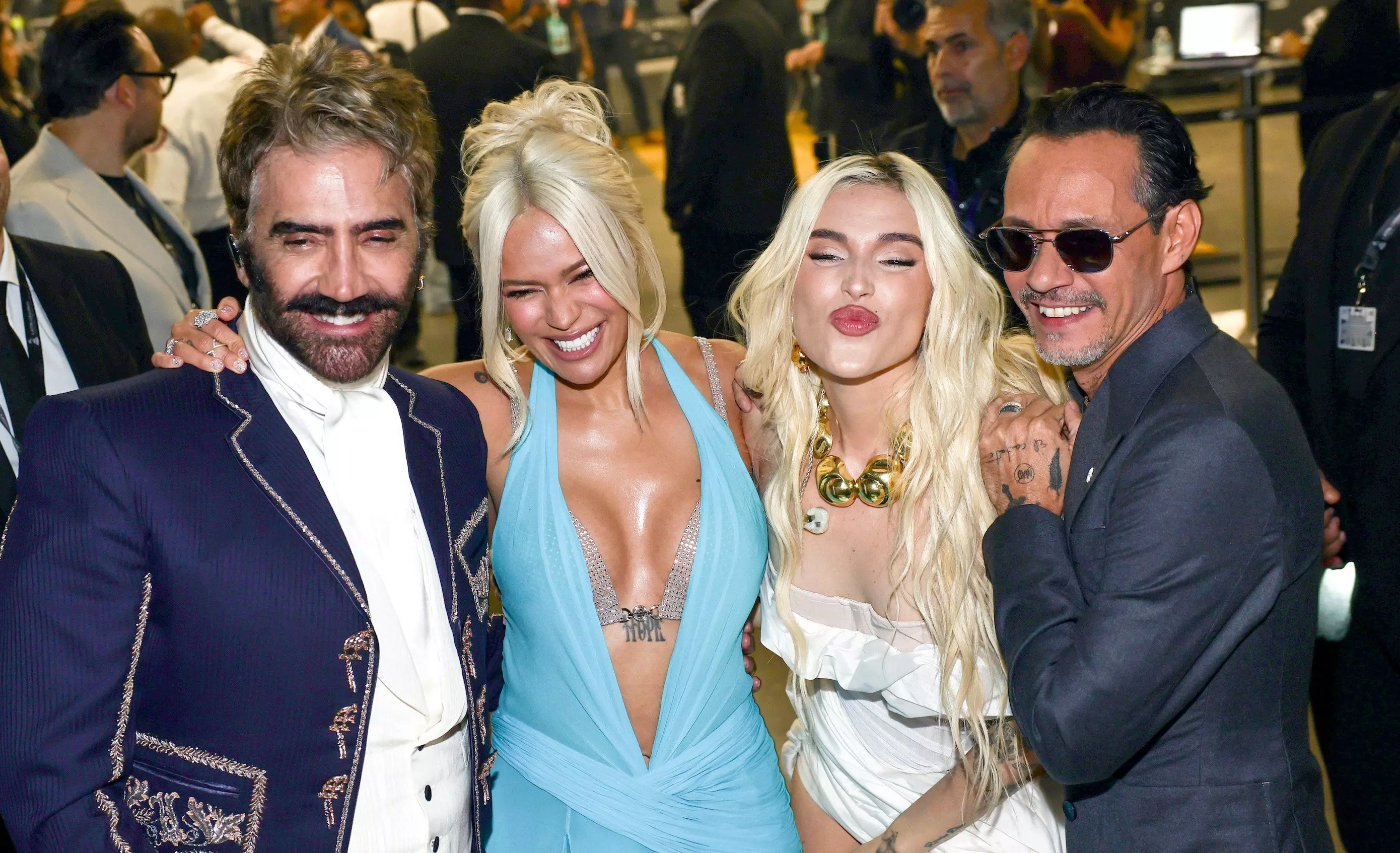
10 Meaningful Moments From The 2024 Latin GRAMMYs: Karol G's Heartfelt Speech, Tributes To Late Legends & More
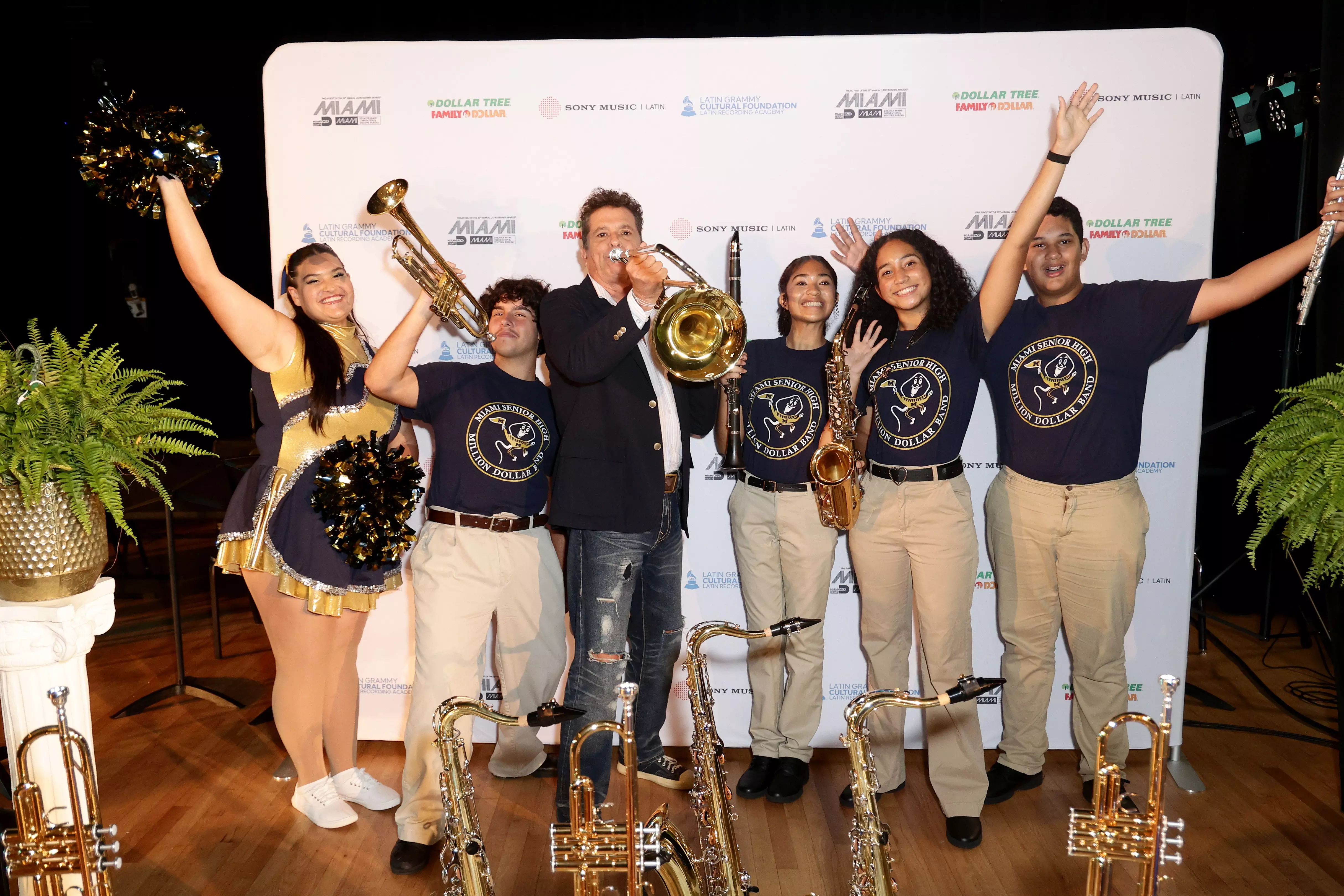
Behind The Scenes At Latin GRAMMY Week 2024: Inside VIP Celebrations & More
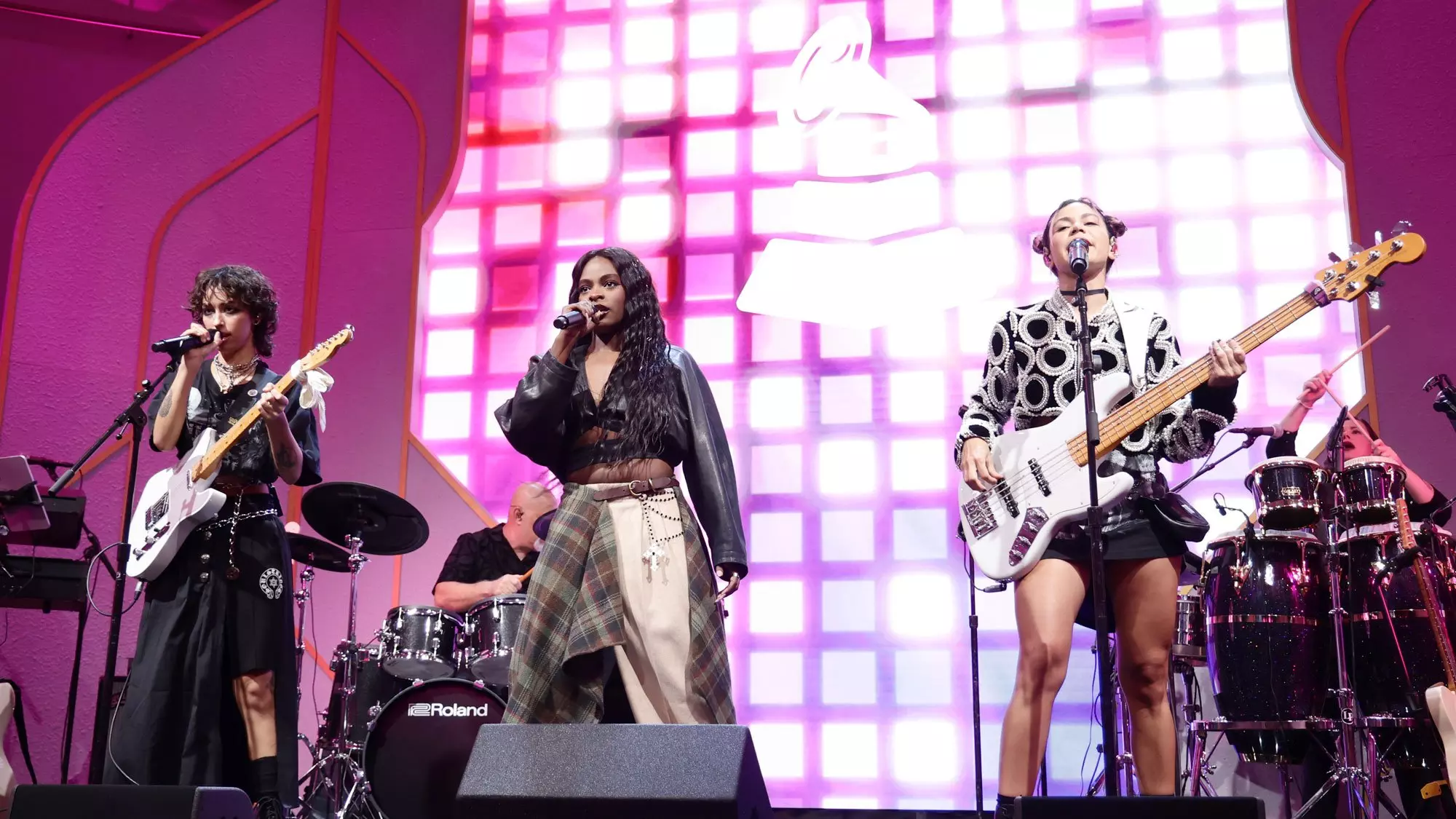
Agris, DARUMAS, Ela Taubert, Kevin Aguilar & More Perform At The 2024 Latin GRAMMYs Best New Artist Showcase
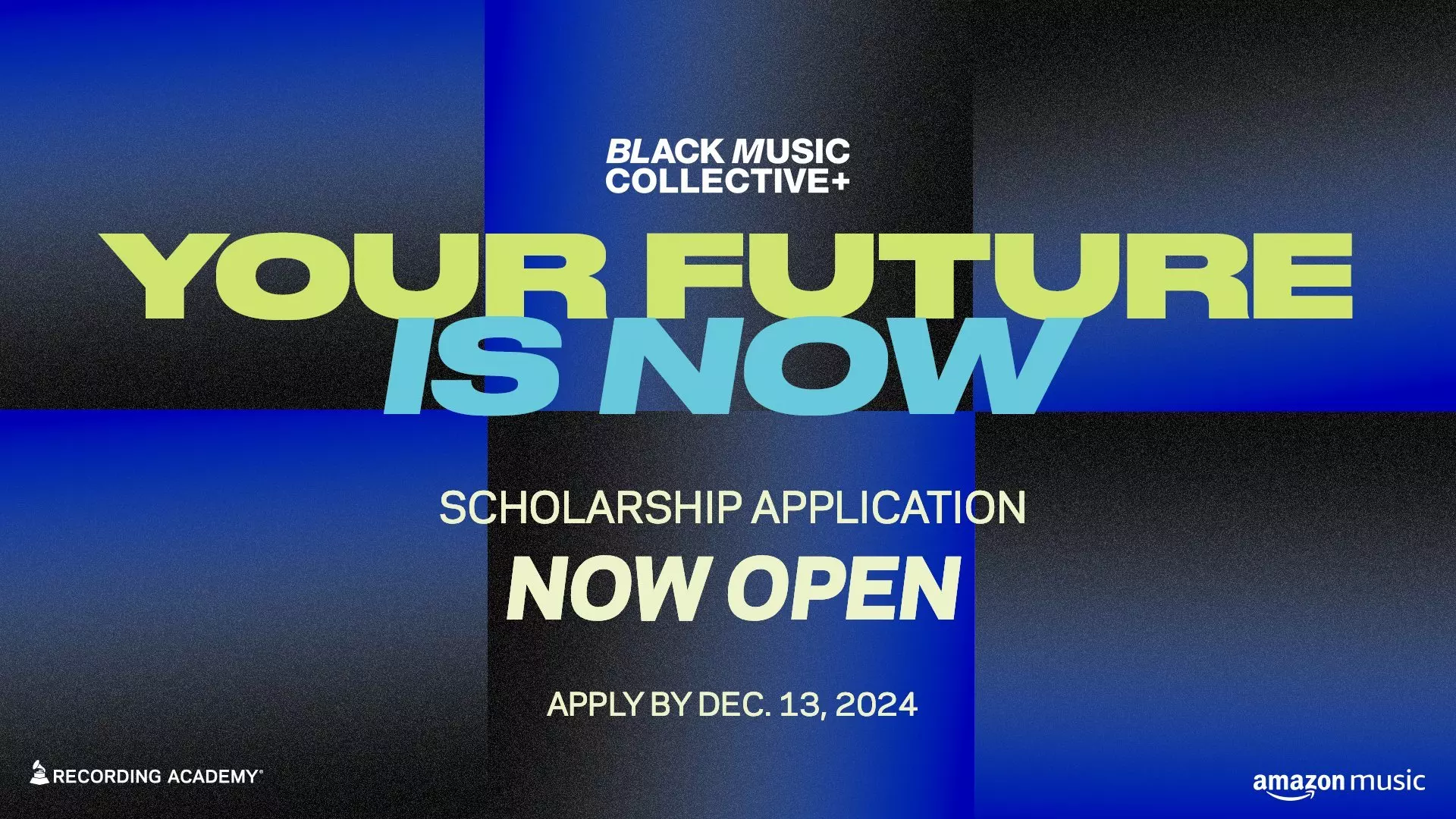
Amazon Music & Black Music Collective Announce Fourth Annual 'Your Future Is Now' Scholarship Program For HBCU Students
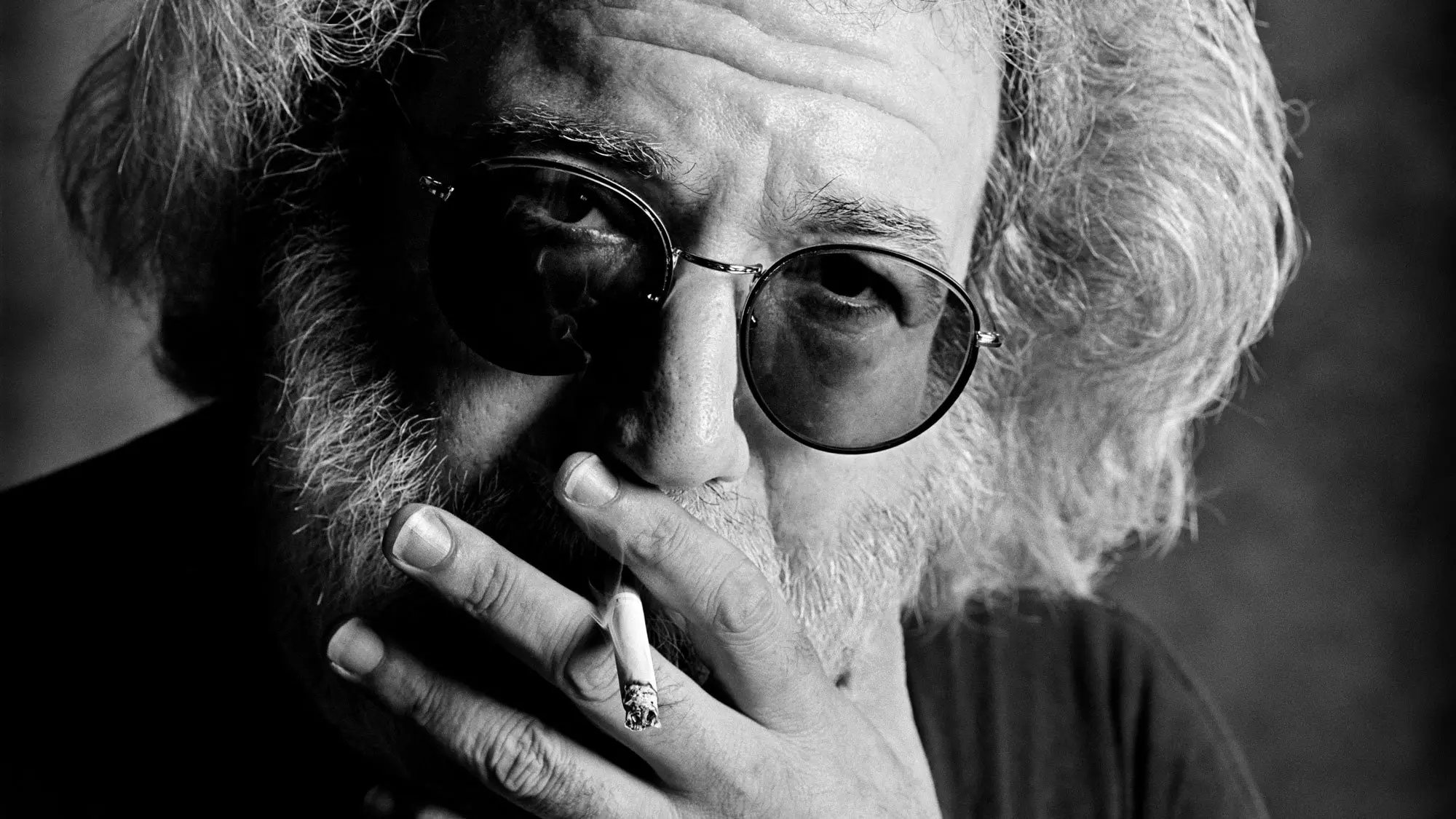
Jay Blakesberg On RetroBlakesberg GRAMMY Museum Exhibit: Bringing 30 Years Of Music To Life, From Grateful Dead To Green Day
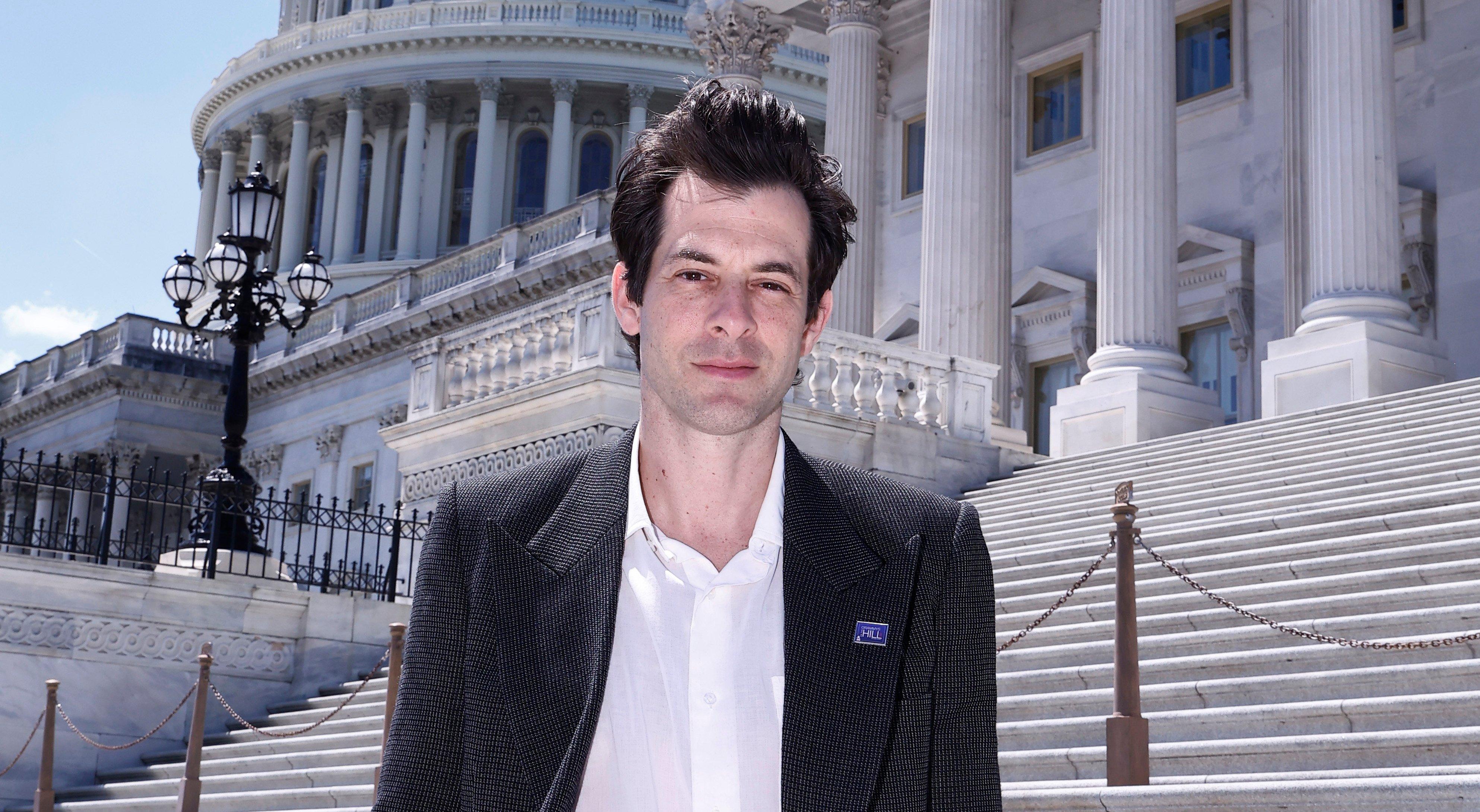
Photo: Paul Morigi/Getty Images for The Recording Academy
list
4 Ways Mark Ronson Has Advocated For The Music Community & Beyond
As the Artist Ambassador for Music Advocacy Day 2024, Mark Ronson leads the fight for creator rights. Ahead of the Oct. 1 event, take a look at some of the ways the producer has made an impact in and outside of the music industry.
Mark Ronson is the definition of a hitmaker. Over the last two decades, the British-born DJ has become one of the most in-demand producers in the music industry.
Behind the boards, he's captured lightning in a bottle with superstars like Amy Winehouse, Bruno Mars, Lady Gaga, and Dua Lipa, while also crafting a signature sound across his solo discography best known for combining Motown funk and '70s disco with contemporary pop.
Now, the eight-time GRAMMY winner has stepped into a new role as the 2024 Artist Ambassador for the Recording Academy's 10th annual Music Advocacy Day.
This year's effort has already broken a new registration record by gathering 2,130 participants, and on Tuesday (Oct. 1), Recording Academy members across 47 states, Washington, D.C., and Puerto Rico will meet with their representatives in Congress to discuss obstacles and opportunities within the music industry and drive legislative policy changes to better support artists and creators.
In a recent open letter to Academy members, Ronson pointed to the ever-increasing shifts happening within the music industry, and urged members to let their voices be heard by proactively advocating for legislation, including the NO FAKES Act to responsibly regulate the use of artificial intelligence in music, and the Fans First Act to reform live event ticketing and protect both artists and consumers.
"If there's one thing I've learned from my years in the studio, it's that music has the power to move mountains," he wrote. "It's more than just beats and lyrics; it's the heartbeat of our culture. The music industry is changing faster than ever, and with those changes come challenges. But these challenges are also our opportunities to shape the future of music."
Below, dive into more about Ronson's impact on the music industry and the ways he's championed access to music, voting rights and more over the course of his illustrious career.
Working With (And For) Amy Winehouse
By the mid-2000s, Ronson had already established himself as a well-known producer in the music industry — having released his debut studio album, Here Comes the Fuzz, in 2003 and worked behind the boards for artists like Macy Gray ("When I See You"), Lily Allen ("Littlest Things") and Christina Aguilera ("Slow Down Baby," "Hurt").
However, the London-born producer's true breakout moment arrived when he connected with Amy Winehouse to co-produce her smash sophomore album Back to Black. While Winehouse's raw lyricism and inimitable voice were both intrinsic parts of her once-in-a-generation talent, Ronson undeniably helped craft the timeless neo-soul sound of songs like "Rehab," "You Know I'm No Good" and "Love Is a Losing Game," and is even listed as a co-writer on the album's tour de force of a title track.
Back to Black rightly turned Winehouse into a superstar before her tragic passing at the age of 27. The album would go on to change the sound of popular music at large, inspire an entire generation of rising female artists, including the likes of Adele and Lady Gaga, and remain widely beloved by both critics and music lovers the world over. (In May, it was ranked No. 8 on Apple Music's list of the 100 best albums in history).
The magical collaboration between artist and producer also earned Ronson his first three GRAMMY Awards — including one for Producer of the Year, Non-Classical — and was a major stepping stone on his path to future culture-defining smashes like "Uptown Funk," "Shallow" and the Barbie soundtrack.
Following Winehouse's untimely death in 2011, Ronson has continued to honor his friend's legacy by becoming a patron of The Amy Winehouse Foundation — the charity launched by the late singer's family to help at-risk young people through music, education about substance abuse and offering other critical support.
Inspiring The Next Generation Of Music Makers
In 2017, Ronson participated in Hope and Homes for Children's End the Silence campaign to aid more than 120,000 children confined to orphanages in Uganda and Rwanda. In a video for the U.K. charity, the producer opened up about his most precious musical memory from childhood involving Grandmaster Flash and the Furious Five's trailblazing 1985 single "The Message."
"It's impossible to think of what any of our childhoods would be like [without music]," he said, "and that's why no child should have to endure life in an orphanage, deprived of love and without music and family. 'Cause that's the essence of, I think, what we need to actually get by."
In the U.S., Ronson has served as a mentor for Turnaround Arts, the John F. Kennedy Center for the Performing Arts' nationwide program to bring arts education to low-performing schools. In his role, the DJ became the Artist in Residency at Sierra Preparatory Academy in Santa Ana, California. Visiting the school in 2019, he invited the Sierra Prep jazz band to learn about the recording process in a professional studio, and helped them record a cover of Ben E. King's "Stand By Me."
"No Time to Die" For Voting Rights
the bond song that never was for the bond film I hope we get to see someday. only available today with all net proceeds going to @votingrightslab https://t.co/aBDy5Vdx2n pic.twitter.com/4SyStGwXZK
— Mark Ronson (@MarkRonson) October 2, 2020
Leading up to the 2020 presidential election, Ronson reached into his vault and dusted off "No Time to Die (Bond Demo)," the demo he crafted with songwriter Ilsey Juber for the 2021 James Bond film of the same name.
Ultimately, producers didn't select Ronson's "No Time to Die" demo as the theme for Daniel Craig's final turn as 007 (instead, that honor went to Billie Eilish's GRAMMY- and Oscar-winning ballad, also titled "No Time To Die"). But the producer lent his prospective Bond theme to an even worthier cause: saving democracy,
"No Time To Die (Bond Demo)" was included on Good Music to Avert the Collapse of American Democracy, Volume 2, a massive 77-track benefit compilation of previously unreleased recordings that raised money during the pivotal election cycle for Voting Rights Lab — a nonprofit dedicated to "accelerating the movement for free and fair elections through expert analysis, research and innovations."
Additionally, the nonpartisan organization employs its State Voting Rights Tracker dashboard to keep track of election-related legislation and current state laws regarding everything from mail voting and voter registration to interference with election administration and the purging of voter rolls in all 50 states in the country as well as Washington, D.C.
Urging Washington Leaders
Prior to becoming the Artist Ambassador for Music Advocacy Day, Ronson headed to Washington, D.C. to participate in The Recording Academy's GRAMMYs on the Hill initiative.
While visiting the nation's capital last May, the producer and the rest of the delegation from The Recording Academy met with top members of the Biden-Harris administration at the White House to discuss issues like artificial intelligence protections for musicians and ticketing reform — both key issues of this year's Music Advocacy Day.
Ronson and Recording Academy CEO Harvey Mason jr. then held meetings with Senate Majority Leader Chuck Schumer (D-N.Y.) and other lawmakers in Congress to discuss legislation affecting the music industry and advocate for other artists and the industry at large.
"I saw firsthand the impact of sharing our stories with the people who represent us," Ronson recalled in his recent letter to Academy members. "Those conversations helped lead to meaningful outcomes on Capitol Hill, including the passage of the TICKET Act in the House, and the introduction of the NO FAKES Act in the Senate. Now, on Music Advocacy Day, we can build on the progress we've made and speak with our Congressional leaders at home in our local communities to ensure they hear our concerns."
Latest Recording Academy News & Initiatives

10 Meaningful Moments From The 2024 Latin GRAMMYs: Karol G's Heartfelt Speech, Tributes To Late Legends & More

Behind The Scenes At Latin GRAMMY Week 2024: Inside VIP Celebrations & More

Agris, DARUMAS, Ela Taubert, Kevin Aguilar & More Perform At The 2024 Latin GRAMMYs Best New Artist Showcase

Amazon Music & Black Music Collective Announce Fourth Annual 'Your Future Is Now' Scholarship Program For HBCU Students

Jay Blakesberg On RetroBlakesberg GRAMMY Museum Exhibit: Bringing 30 Years Of Music To Life, From Grateful Dead To Green Day
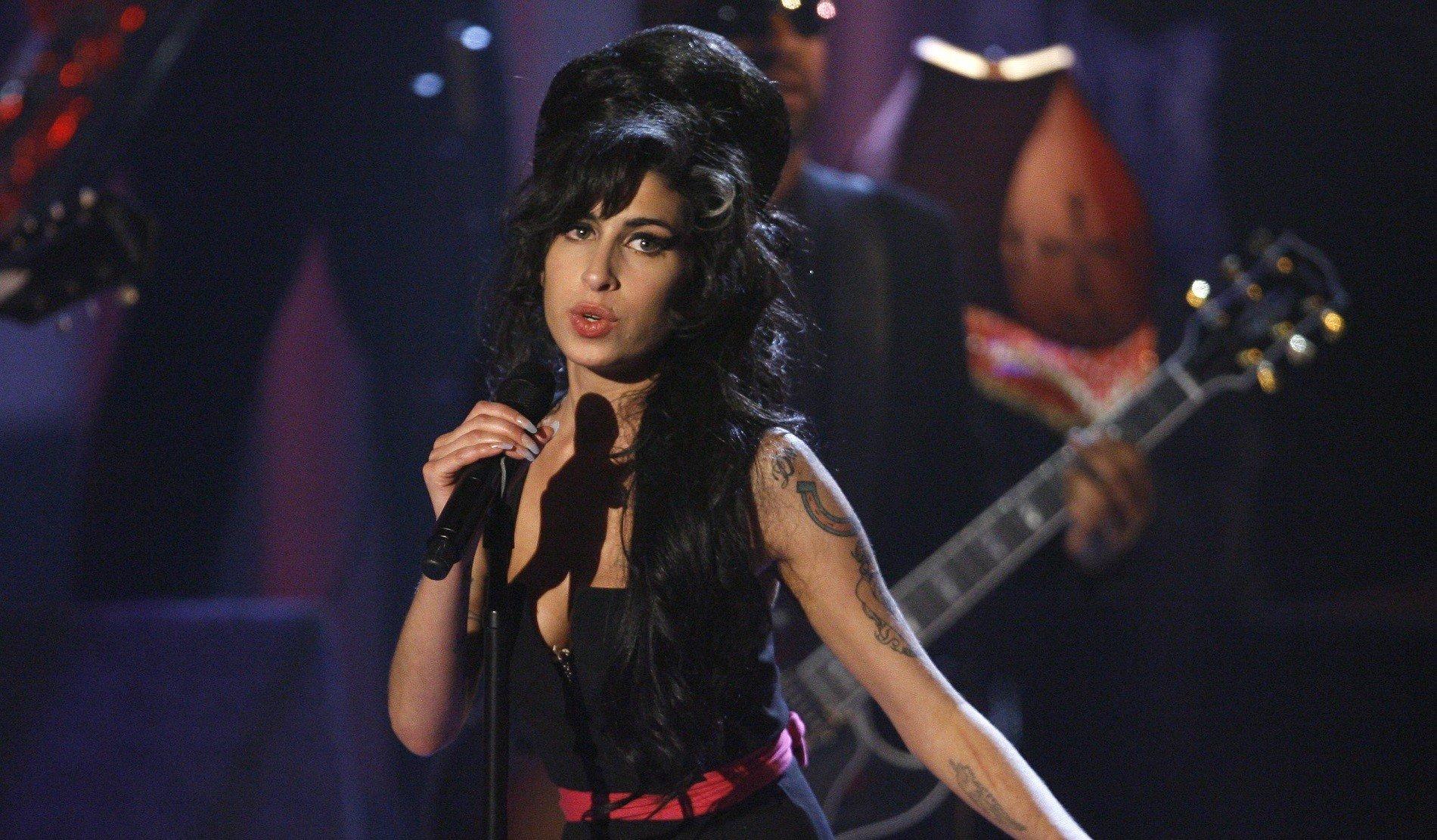
Photo: Chris Polk/FilmMagic
list
How Amy Winehouse's 'Back To Black' Changed Pop Music Forever
Ahead of the new Amy Winehouse biopic 'Back To Black,' reflect on the impact of the album of the same name. Read on for six ways the GRAMMY-winning LP charmed listeners and changed the sound of popular music.
When Amy Winehouse released Back To Black in October 2006, it was a sonic revelation. The beehive-wearing singer’s second full-length blended modern themes with the Shangri-Las sound, crafting something that seemed at once both effortlessly timeless and perfectly timed.
Kicking off with smash single "Rehab" before blasting into swinging bangers like "Me & Mr. Jones," "Love Is A Losing Game," and "You Know I’m No Good," Black To Black has sold over 16 million copies worldwide to date and is the 12th best-selling record of all time in the United Kingdom. It was nominated for six GRAMMY Awards and won five: Record Of The Year, Song Of The Year, Best New Artist, Best Female Pop Vocal Performance, and Best Pop Vocal Album.
Winehouse accepted her golden gramophones via remote link from London due to visa problems. At the time, Winehouse set the record for the most GRAMMYs won by a female British artist in a single year, though that record has since been broken by Adele, who won six in 2011.
Written in the wake of a break-up with on-again, off-again flame Blake Fielder-Civil, Black To Black explores heartbreak, grief, and infidelity, as well as substance abuse, isolation, and various traumas. Following her death in 2011, Back To Black became Winehouse’s most enduring legacy. It remains a revealingly soulful message in a bottle, floating forever on the waves.
With the May 17 release of Sam Taylor-Johnson’s new (and questionably crafted) Winehouse biopic, also titled Back To Black, it's the perfect time to reflect on the album that not only charmed listeners but changed the state of a lot of popular music over the course of just 11 songs. Here are five ways that Back To Black influenced music today.
She Heralded The Arrival Of The Alt Pop Star
When Amy Winehouse hit the stage, people remarked on her big voice. She had classic, old-time torch singer pipes, like Sarah Vaughn or Etta Jones, capable of belting out odes to lost love, unrequited dreams, and crushing breakups. And while those types of singers had been around before Winehouse, they didn’t always get the chance — or grace required — to make their kind of music, with labels and producers often seeking work that was more poppy, hook-packed, or modern.
The success of Back To Black changed that, with artists like Duffy, Adele, and even Lady Gaga drawing more eyes in the wake of Winehouse’s overwhelming success. Both Duffy and Adele released their debut projects in 2007, the year after Back To Black, bringing their big, British sound to the masses. Amy Winehouse's look and sound showed other aspiring singers that they could be different and transgressive without losing appeal.
Before she signed to Interscope in 2007, "nobody knew who I was and I had no fans, no record label," Gaga told Rolling Stone in 2011. "Everybody, when they met me, said I wasn’t pretty enough or that my voice was too low or strange. They had nowhere to put me. And then I saw [Amy Winehouse] in Rolling Stone and I saw her live. I just remember thinking ‘well, they found somewhere to put Amy…’"
If an artist like Winehouse — who was making records and rocking styles that seemed far outside the norm — could break through, then who’s to say someone else as bold or brassy wouldn’t do just as well?
It Encouraged Other Torch Singers In The New Millenium
Back To Black might have sounded fun, with swinging cuts about saying "no" to rehab and being bad news that could seem lighthearted to the casual listener. Dig a little deeper, though, and it’s clear Winehouse is going through some real romantic tumult.
Before Back To Black was released, Fielder-Civil had left Winehouse to get back together with an old girlfriend, and singer felt that she needed to create something good out of all those bad feelings. Songs like "Love Is A Losing Game" and "Tears Dry On Their Own" speak to her fragile emotional state during the making of the record, and to how much she missed Fielder-Civil. The two would later marry, though the couple divorced in 2009.
Today, young pop singers like Olivia Rodrigo, Taylor Swift, and Selena Gomez are lauded for their songs about breakups, boyfriends, and the emotional damage inflicted by callous lovers. While Winehouse certainly wasn’t the first to sing about a broken heart, she was undoubtedly one of the best.
It Created A Bit Of Ronsonmania
Though Mark Ronson was already a fairly successful artist and producer in his own right before he teamed with Winehouse to write and co-produce much of Back To Black, his cred was positively stratospheric after the album's release. Though portions of Back To Black were actually produced by Salaam Remi (who’d previously worked with Winehouse on Frank and who was reportedly working on a follow-up album with her at the time of her death), Ronson got the lion’s share of credit for the record’s sound — perhaps thanks to his his GRAMMY win for Best Pop Vocal Album. Winehouse would even go on to guest on his own Version record, which featured the singer's ever-popular cover of "Valerie."
In the years that followed, Ronson went on to not only produce and make his own funky, genre-bending records, but also to work with acts like Adele, ASAP Rocky, and Paul McCartney, all of whom seemingly wanted a little of the retro soul Ronson could bring. He got huge acclaim for the funk-pop boogie cut "Uptown Funk," which he wrote and released under his own name with help from Bruno Mars, and has pushed into film as well, writing and producing over-the-top tracks like A Star Is Born’s "Shallow" and Barbie’s "I’m Just Ken." To date, he’s been nominated for 17 GRAMMY Awards, winning eight.
Ronson has always acknowledged Winehouse’s role in his success, as well, telling "BBC Breakfast" in 2010, "I've always been really candid about saying that Amy is the reason I am on the map. If it wasn't for the success of Back To Black, no one would have cared too much about Version."
Amy Showcased The Artist As An Individual
When the GRAMMY Museum hosted its "Beyond Black - The Style of Amy Winehouse" exhibit in 2020, Museum Curator and Director of Exhibitions Nicholas Vega called the singer's sartorial influence "undeniable." Whether it was her beehive, her bold eyeliner, or her fitted dresses, artists and fans had adopted elements of Winehouse’s Back To Black style into their own fashion repertoire. And though it’s the look we associate most with Winehouse, it was actually one she had truly developed while making the record, amping up her Frank-era low-slung jeans, tank tops, and polo shirts with darker eyeliner and much bigger hair, as well as flirty dresses, vibrant bras, and heels.
"Her stylist and friends were influential in helping her develop her look, but ultimately Amy took bits and pieces of trends and styles that she admired to create her own look," Vega told GRAMMY.com in 2020. While rock ‘n’ rollers have always leaned into genre-bending styles, Winehouse’s grit is notable in the pop world, where artists typically have a bit more of a sheen. These days, artists like Miley Cyrus, Billie Eillish, and Demi Lovato are willing to let their fans see a bit more of the grit — thanks, no doubt, to the doors Winehouse opened.
Winehouse also opened the door to the beauty salon and the tattoo studio, pushing boundaries with not just her 14 different vintage-inspired tattoos — which have become almost de rigeur these days in entertainment — but also with her signature beehive-like bouffant, which hadn’t really been seen on a popular artist since the ‘60s.It’s a frequent look for contemporary pop divas, popping up on artists like Ariana Grande, Lana Del Rey, and Dua Lipa.
The Dap-Kings Got The Flowers They Deserved
Six of Back To Black’s 11 songs, including "Rehab," got their "retro" sound via backing from the Dap-Kings, a Brooklyn-based soul act Ronson recruited for the project.
While Winehouse’s lyrics were mostly laid down in London, the Dap-Kings did their parts in New York. Ronson told GRAMMY.com in 2023 that the Dap-Kings "brought ['Rehab'] to life," saying, "I felt like I was floating because I couldn’t believe anybody could still make that drum sound in 2006." Winehouse and the Dap-Kings met months later after the record was released, and recorded "Valerie." The band later backed Winehouse on her U.S. tour.
Though the Dap-Kings were known in hip musical circles for their work with late-to-success soul sensation Sharon Jones, Back To Black’s immense success buoyed the listening public’s interest in soul music and the Dap-Kings' own profile (not to mention that of their label, Daptone Records).
"Soul music never went away and soul lovers never went away, but they’re just kind of closeted because they didn’t think it was commercially viable," Dap-Kings guitarist Binky Griptite said in the book It Ain't Retro: Daptone Records & The 21st Century Soul Revolution. "Then, when Amy’s record hit, all the undercover soul fans are like, I’m free. And then that’s when everybody’s like, Oh, there’s money in it now."
The success of Back To Black also seems to have firmly cemented the Dap-Kings in Ronson’s Rolodex, with the group’s drummer Homer Steinweiss, multi-instrumentalist Leon Michaels, trumpeter Dave Guy, and guitarist/producer Tom Brenneck appearing on many of his projects; the Dap-Kings' horns got prominent placement in "Uptown Funk."
Amy Exposed The Darker Side Of Overwhelming Success
Four years after Winehouse died, a documentary about her life was released. Asif Kapadia’s Amy became an instant rock-doc classic, detailing not only Winehouse’s upbringing, but also her struggles with fame and addiction. It won 30 awards after release, including Best Documentary Feature at the 88th Academy Awards and Best Music Film at the 58th GRAMMY Awards.
It also made a lot of people angry — not for how it portrayed Winehouse, but for how she was made to feel, whether by the British press or by people she considered close. The film documented Winehouse’s struggles with bulimia, self-harm, and depression, and left fans and artists alike feeling heartbroken all over again about the singer’s passing.
The documentary also let fans in on what life was really like for Winehouse, and potentially for other artists in the public eye. British rapper Stormzy summed it up well in 2016 when he told i-D, "I saw the [documentary, Amy] – it got me flipping angry... [Amy’s story] struck a chord with me in the sense that, as a creative, it looks like on the outside, that it’s very ‘go studio, make a hit, go and perform it around the world, champagne in the club, loads of girls’. But the graft and the emotional strain of being a musician is very hard. No one ever sees that part."
These days, perhaps because of Winehouse’s plight or documentaries like Amy, the music-loving population seems far more inclined to give their favorite singers a little grace, whether it’s advocating for the end of Britney Spears’ conservatorship or sympathizing with Demi Lovato’s personal struggles. Even the biggest pop stars are still people, and Amy really drove that point home.
We Only Said Goodbye With Words: Remembering Amy Winehouse 10 Years Later
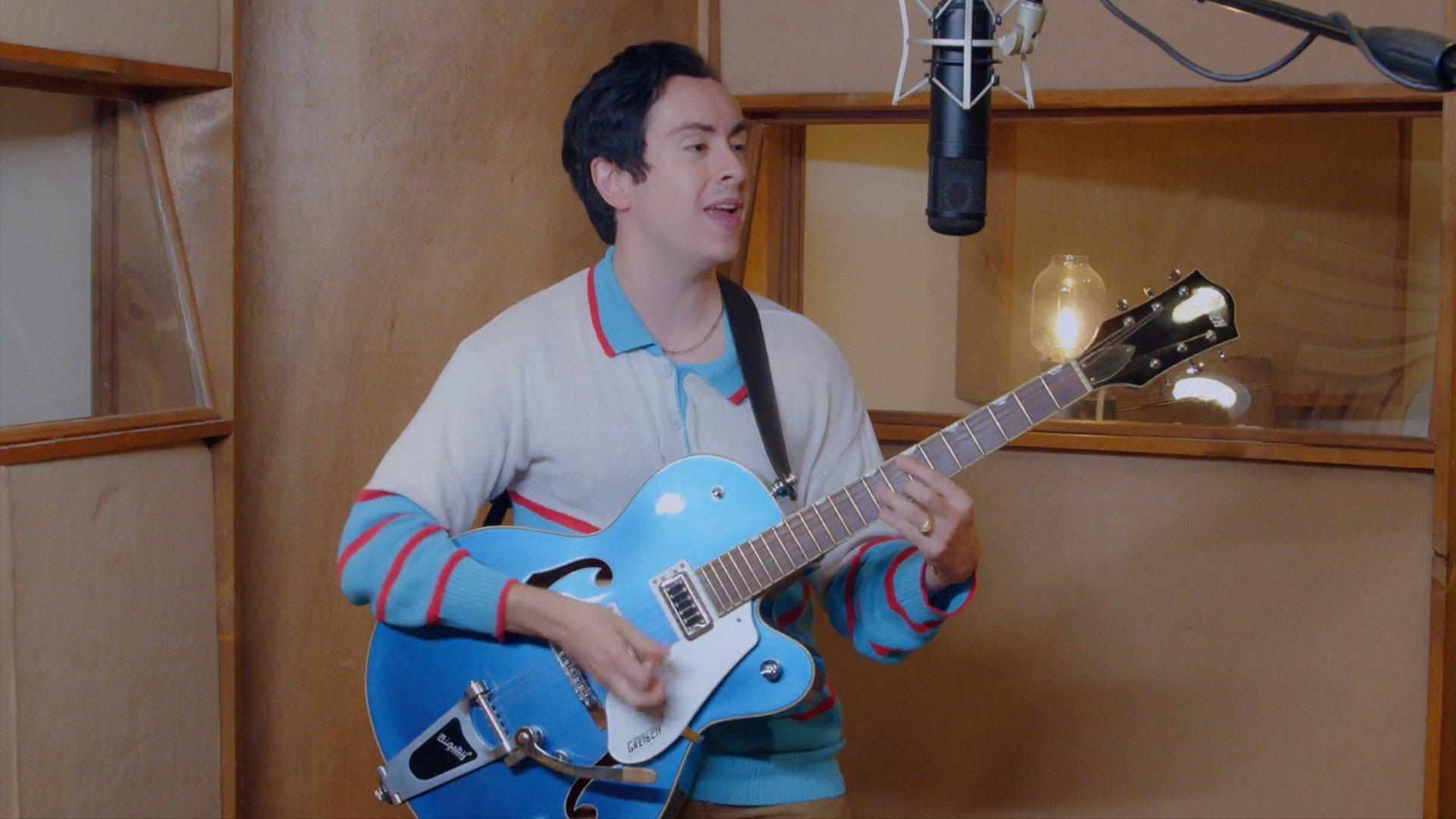
Photo: Courtesy of Dylan Chambers
video
ReImagined: Watch Dylan Chambers Channel Bruno Mars In This Groovy Cover Of "Uptown Funk"
Pop-soul newcomer Dylan Chambers offers his rendition of "Uptown Funk," Mark Ronson and Bruno Mars' infectious 2014 hit.
In the latest episode of ReImagined, soul-pop newcomer Dylan Chambers delivers a fresh, heartfelt take on "Uptown Funk", using an electric guitar to drive the performance.
In the year of its inception, Mark Ronson and Bruno Mars' "Uptown Funk" quickly made strides across the map, from a No. 1 peak on the Billboard Hot 100 to a Record Of The Year and Best Pop Duo/Group Performance win at the 2014 GRAMMYs. Ten years after its release, it is the ninth most-viewed YouTube video of all-time and was named one of Billboard's "Songs That Defined The Decade."
Chambers named Mars as one of his most influential inspirations and praised Silk Sonic's Las Vegas residency as one of the "greatest concerts" he has attended in an interview with Muzic Notez.
"Don't believe me, just watch," Chambers calls in the chorus, recreating its notable doo-wop ad-libs with the strums of his instrument.
Chambers dropped his latest single, "I Can Never Get Enough" on April 10, following his March release "High (When I'm Low)." Both tracks will be a part of his upcoming EP, For Your Listening Pleasure!, out May 17.
Press play on the video above to watch Dylan Chambers' groovy rendition of Bruno Mars & Mark Ronson's "Uptown Funk," and check back to GRAMMY.com for more new episodes of ReImagined.
